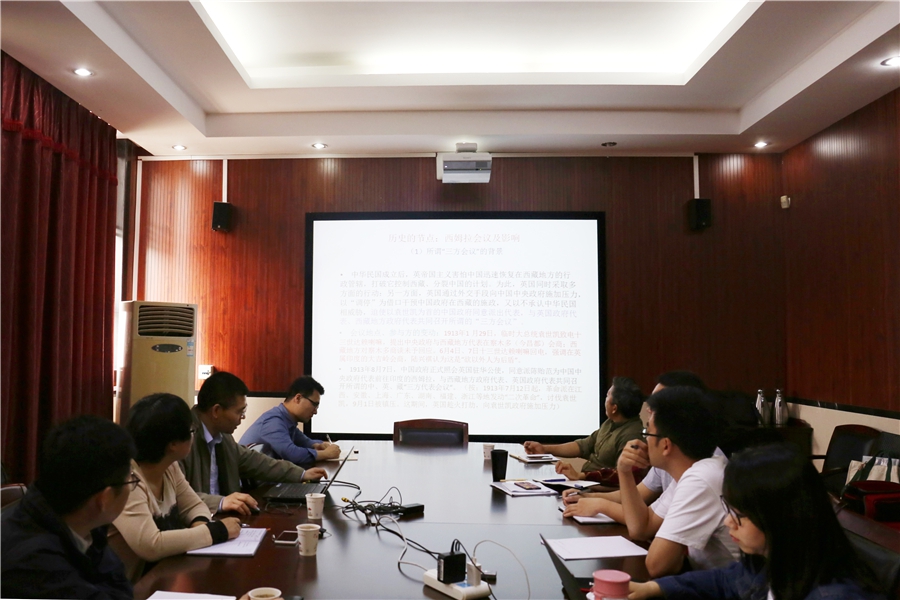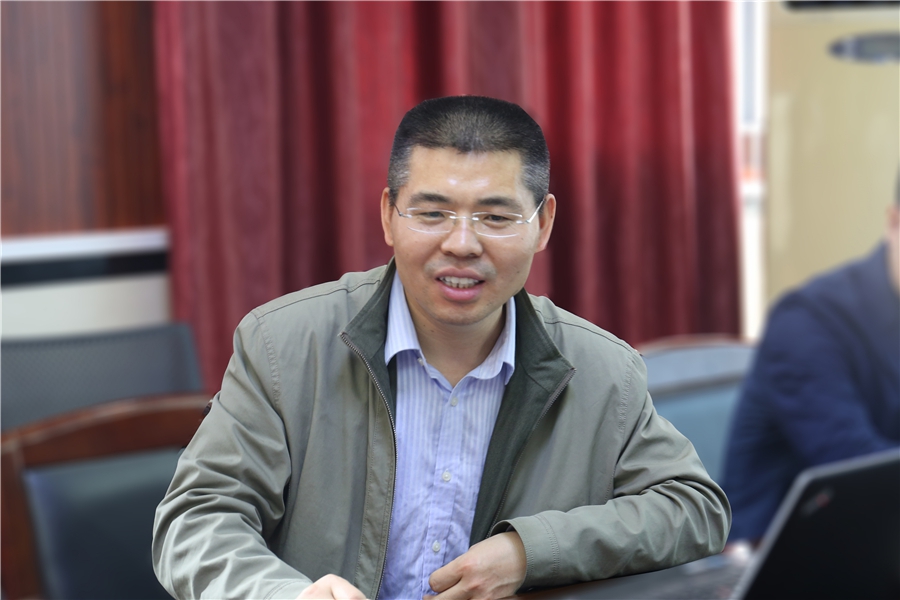On the morning of 27th April, at the invitation of Prof. Guan Peifeng, the head of the team of Wuhan University's “Collecting and Researching Program on Archives of Land Border Issues in China since Modern Times”, Sun Hongnian, Director and Professorial Research Fellow of the Southwest Borderland Studies Office of the Institute of Chinese Borderland Studies, gave a seminar on “Tibet Governance since the 20th Century: An Academic Reflection” in the China Institute of Boundary and Ocean Studies (CIBOS). Deng Lie and Deng Hongying, from Zhongnan University of Economics and Law, and Chen Fei, from Huazhong Normal University, as well as faculties and students from CIBOS and Wuhan University Institute for International Studies (IIS), attended this seminar.

Mr. Sun Hongnian pointed out that "Tibet is an integral part of Chinese territory" is a political concept that Chinese central government has followed since the 20th century. In the introduction of the first part, “Change and Unchange: Dialogue between the Central Government and the Tibetan Authority”, Mr. Sun Hongnian analyzed many dialogues and discussions between the central government and the Tibetan authority since 1912, and pointed out the significance of the peaceful liberation of Tibet by People’s Republic of China government. As for the so-called "Great Tibet" concept that has been propagandized by "Tibetan independence movement" forces for decades, Mr. Sun Hongnian made a well-founded academic refutation from a historical perspective in the second part. From ancient times to the beginning of the 7th century, whether in today’s Tibet Autonomous Region, the Tibetan residential areas in Qinghai, Gansu, Sichuan, and Yunnan provinces, or in the Tibetan residential areas such as Ladakh, which is now outside China’s territory, although the ancestors of Tibetan people appeared in these areas, they have never established a state. The concept of the so-called "Great Tibet" originated at the Shimla Conference in 1913, as the conspiracy to split China’s territory with the support of imperialism. In the third part, Mr. Sun Hongnian pointed out that in the early years of the Republic of China, there was a discussion about “provincial construction” and “autonomy” in the administrative management of Tibet. It is proved by practice that the system of regional national autonomy implemented in Tibet since the founding of New China has made a historic leap forward from the feudal serf system with the unity of politics and religion to the socialist system with the people's democracy, and the Tibetan people have entered a new era of being the masters of their own life.

(Mr. Sun Hongnian)
Mr. Sun Hongnian emphasized the dialectical view of Tibet from two aspects: the relationship between movement and quiet: stability and development, and the relationship between internal affairs and foreign affairs. Before 1949, Tibet's social development was still in a stagnant state for a long time, and it failed to achieve stability and development. After the founding of the People's Republic of China, especially for the more than 60 years after the peaceful liberation of Tibet, it has achieved a tremendous transformation in social systems, and the economic and social development achievements have attracted worldwide attention. However, at the same time, Tibet governance was suffered from the "Tibetan independence" movement and the western anti-China forces. There are still unstable factors in social management. How to deal with domestic and foreign-related struggles remains a major challenge in Tibet governance. Since 1949, the Communist Party of China has led people of all ethnic groups, patriots from all social classes in Tibet to implement the policy of regional ethnic autonomy, and actively promoted democratic reform. These have written a glorious chapter in the history of China's border governance, as well as demonstrate a giant leap in the policy of China’s border governance.
During the discussion session, Mr. Sun Hongnian talked with teachers and students on many issues such as the trade between China and India in recent years, the religious influence of the Dalai Lama clique in southeastern countries, how to carry out cross-provincial governance at the Sichuan-Tibet border, how to promote the economic and social development in Tibet, how to accelerate the opening up and other related topics.
(Rewritten by Yang Jingjie)
(Edited by Fu Shanshan)
